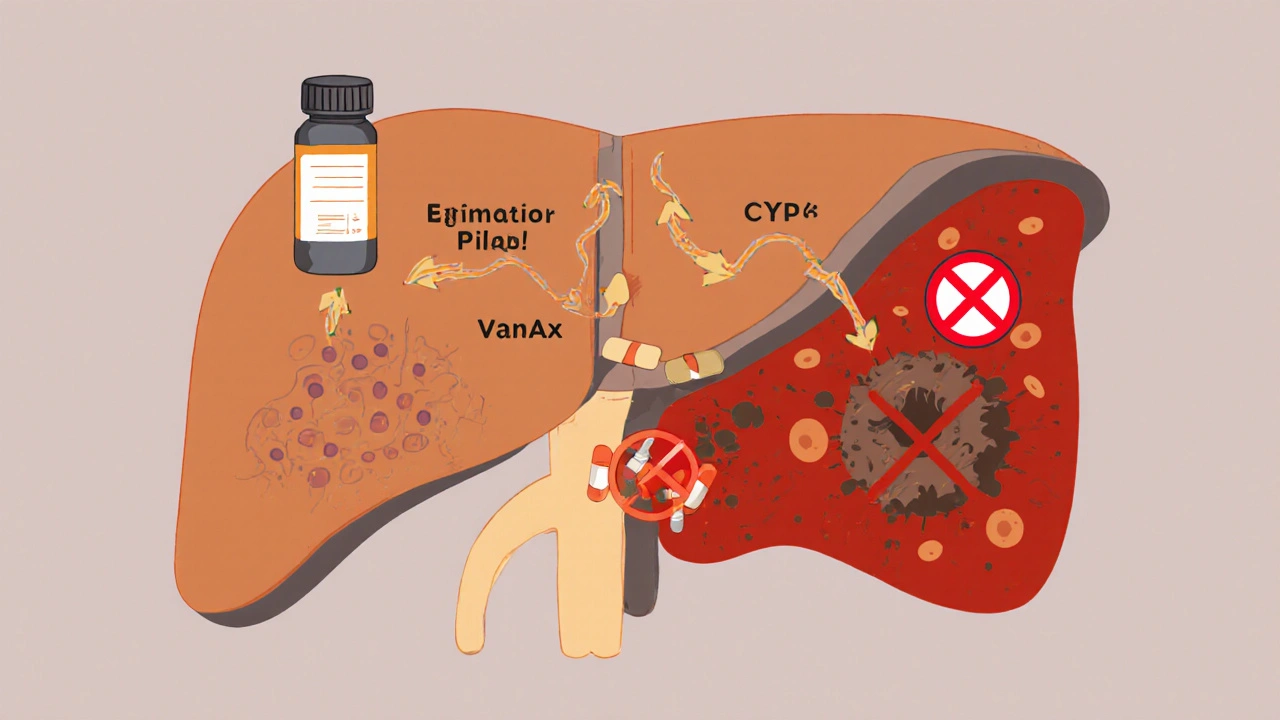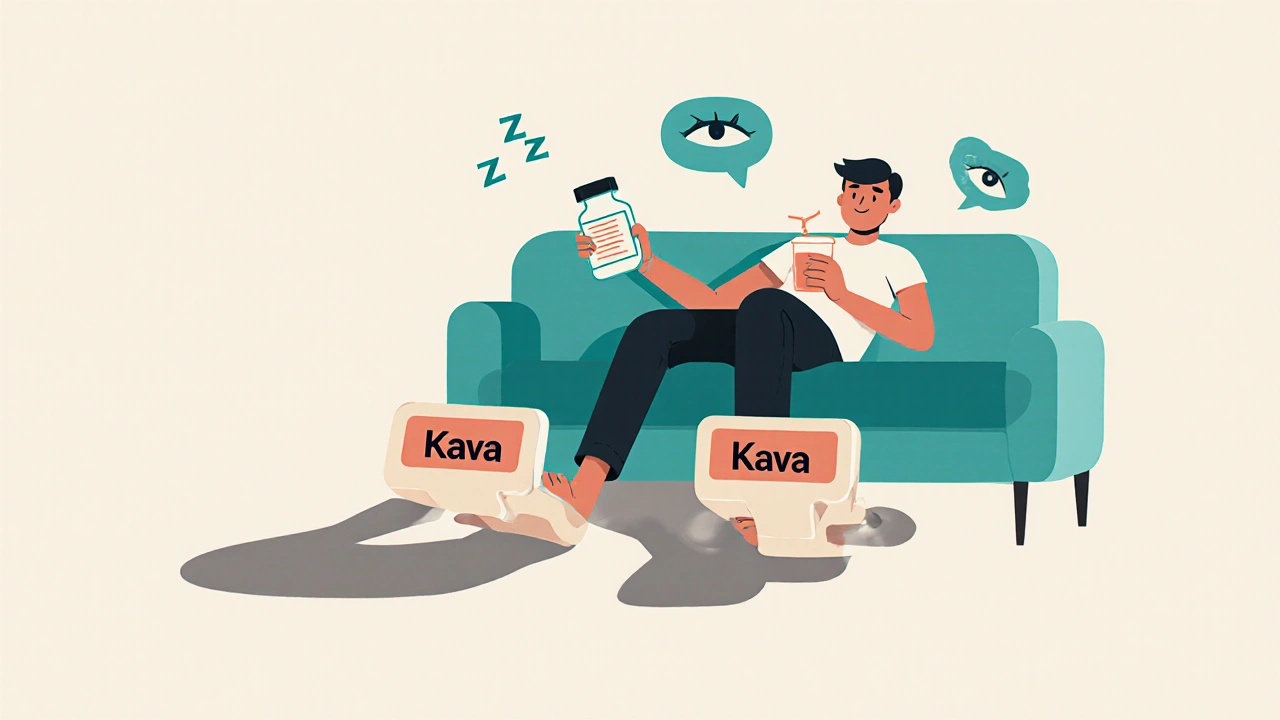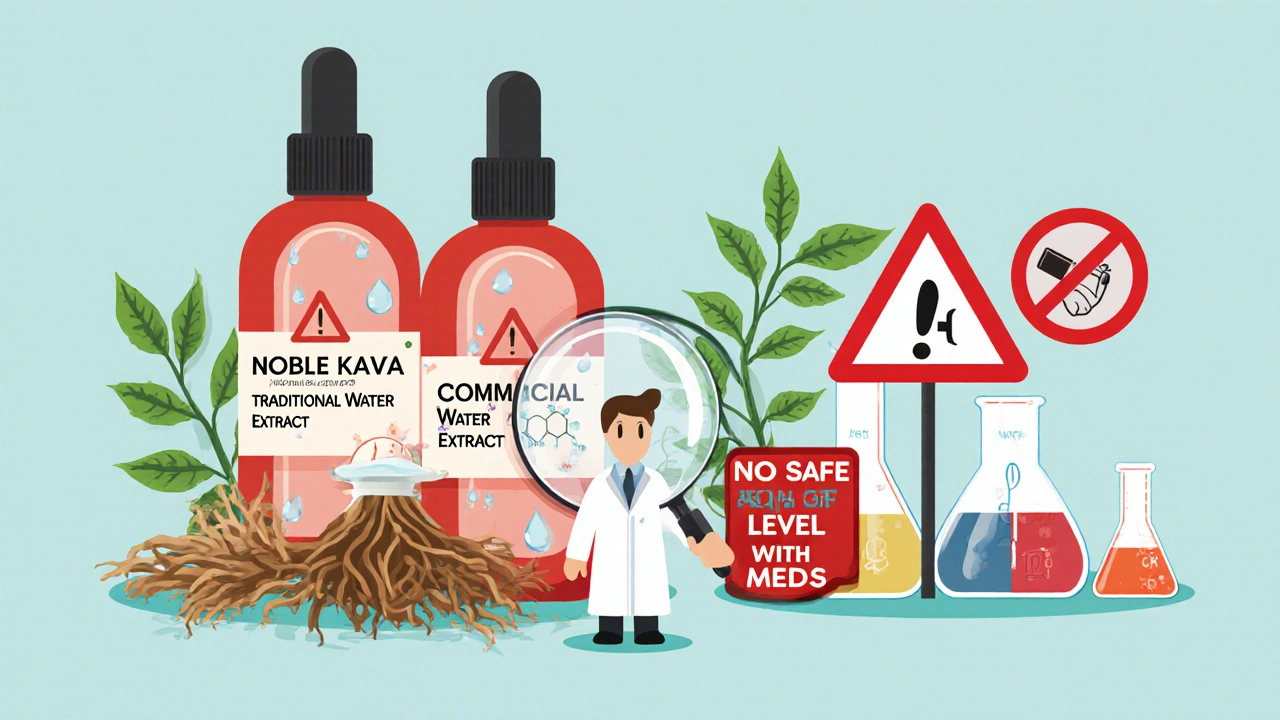Kava and Sedative Medications: What You Need to Know About Liver and Sedation Risks
 Nov, 26 2025
Nov, 26 2025
Combining kava with sedative medications isn’t just a bad idea-it can be dangerous. If you’re taking anything for anxiety, sleep, or muscle relaxation, and you’re also using kava, you’re playing with fire. This isn’t speculation. It’s documented. People have ended up in the hospital. Some needed liver transplants. And it’s not rare. The FDA has been warning about this since 2002, and since then, over 25 international cases of severe liver injury linked to kava have been reported. Many of those cases happened when kava was mixed with prescription sedatives.
How Kava Works (And Why It’s Risky With Medications)
Kava comes from the roots of the Piper methysticum plant, traditionally used in Pacific Island ceremonies for its calming effects. The active compounds, called kavalactones, cross the blood-brain barrier in under 15 minutes. They hit the same brain receptors as benzodiazepines-like Xanax or Valium-but without the same level of control over dosage. A traditional water-based kava drink might contain 150-250 mg of kavalactones. Commercial pills or tinctures? Some pack up to 300 mg per dose. That’s a lot.
Here’s the real problem: kava doesn’t just make you sleepy. It interferes with how your liver breaks down medications. It blocks key enzymes-CYP2D6, CYP2C9, and CYP3A4-that your body uses to process drugs like alprazolam, diazepam, lorazepam, and even some antidepressants. When these enzymes are blocked, the medication builds up in your system. That means you get more sedation than intended. One study showed kava increased midazolam levels by 27%. That’s like taking a double dose without knowing it.
The Liver Risk Is Real-And Often Overlooked
Liver damage from kava doesn’t come with a warning sign. No rash. No fever. Just fatigue, nausea, dark urine, and yellowing eyes-symptoms many people dismiss as stress or the flu. By the time they see a doctor, ALT levels (a liver enzyme) can be over 2,800 U/L. Normal is under 40. One Sacramento County case study described a 42-year-old who took 300 mg of kava daily with 2 mg of alprazolam. Within 90 days, their liver was failing. They needed hospitalization.
What makes this worse is that most people don’t tell their doctors they’re taking kava. Sacramento County researchers found only 22% of patients with liver problems mentioned kava use when asked. They think it’s “just a natural remedy.” It’s not. It’s a potent bioactive substance with no quality control. A supplement labeled “500 mg kava extract” could contain anywhere from 50 to 300 mg of actual kavalactones. There’s no standard. No testing. No guarantee.
What Happens When Kava Meets Sedatives?
Think of your nervous system as a car. Sedatives are the brakes. Kava is a second set of brakes you didn’t know was installed. When you press the pedal (take your medication), both systems engage. You don’t just stop-you slam to a halt.
People report:
- Being unable to stand for hours after combining kava with lorazepam
- Confused speech and memory gaps
- Extreme drowsiness that lasts all day
- Loss of coordination, slurred speech, slow breathing
These aren’t anecdotes from Reddit. These are documented cases in medical journals. The FDA’s adverse event database has 37 reports of sedation-related emergencies tied to kava use, 12 of which required hospital care. On Drugs.com, 37% of users who combined kava with alcohol said they experienced “severe drowsiness.”
It’s not just benzodiazepines. Kava also interacts dangerously with:
- Barbiturates
- Antihistamines (like diphenhydramine)
- Opioids (even low-dose codeine)
- Sleep aids like zolpidem
- Antipsychotics like haloperidol (risk of dangerous heart rhythm changes)
And alcohol? That’s a triple threat. It increases liver toxicity, boosts sedation, and worsens the risk of respiratory depression. One patient in a 2023 case study needed treatment for coagulopathy after mixing kava with diazepam and wine.

Who’s Most at Risk?
You’re at higher risk if:
- You’re over 50
- You have a history of liver disease (even mild fatty liver)
- You take multiple sedatives or antidepressants
- You use kava daily for more than a few weeks
- You buy kava from online retailers or unregulated brands
Australia’s Therapeutic Goods Administration says the risk of serious liver injury is “very low but not negligible”-but only if you stick to ≤70 mg daily and get liver tests every two weeks. Most people don’t. They take 250 mg or more, every day, for months. That’s a recipe for trouble.
What About “Noble Kava”? Is It Safer?
Some sellers claim “noble kava” is safe because it’s the kind used in traditional Pacific ceremonies. There’s some truth to that. The World Health Organization’s 2023 report found that traditional water-based kava had only 0.8 adverse events per 100,000 servings. Commercial extracts? 7.3 per 100,000. That’s nearly 10 times higher.
Why? Because commercial products often use stems, leaves, or non-noble root varieties-parts of the plant that contain higher levels of toxic compounds. Traditional preparation uses only peeled root, soaked in cold water. No alcohol. No acetone. No solvents. That matters.
But here’s the catch: even noble kava can still inhibit liver enzymes. The European Food Safety Authority says there’s no safe level of kava for people taking medications metabolized by CYP2D6, CYP2C9, or CYP3A4. That includes most antidepressants, blood pressure meds, and anti-anxiety drugs. So even if you’re using “high-quality” kava, if you’re on meds, you’re still at risk.

What Should You Do?
If you’re taking sedative medications and using kava:
- Stop immediately. Don’t wait for symptoms. The damage can be silent.
- Talk to your doctor. Bring your kava bottle. Show them the label. Ask about liver enzyme tests.
- Don’t switch to another herb. Valerian? Chamomile? They’re safer-but not risk-free. Some still interact with meds.
- Check your meds. Use a reliable drug interaction checker (like Medscape or Lexicomp) and enter every supplement you take.
If you’ve been using kava for anxiety and want to stop:
- Don’t quit cold turkey if you’ve been using it daily for months. Talk to your doctor about tapering.
- Consider therapy (CBT) or FDA-approved alternatives like buspirone, which has no known liver toxicity.
- Ask about non-pharmaceutical options: exercise, sleep hygiene, mindfulness. These work-and they don’t risk your liver.
The Bottom Line
Kava isn’t a harmless herbal tea. It’s a powerful substance with real, documented risks-especially when mixed with sedatives. The fact that it’s sold as a “dietary supplement” in the U.S. doesn’t mean it’s safe. It means it’s unregulated. The FDA hasn’t banned it, but they’ve issued a warning for over two decades. Other countries banned it for a reason.
If you’re on anxiety meds, sleep aids, or even just occasional Benadryl for allergies, don’t take kava. Period. The risk of liver damage or dangerous sedation isn’t worth it. Even if you feel fine now, the damage can build silently. And once your liver is injured, it doesn’t always heal.
There are safer ways to manage anxiety and sleep. Talk to your doctor. Try proven, tested options. Your liver will thank you.
Can kava cause liver damage even if I don’t take any medications?
Yes. While the risk is higher when combined with medications, there are documented cases of liver failure in people who took kava alone. The European Food Safety Authority and the FDA both state that kava can cause severe liver injury even without other drugs. The exact mechanism isn’t fully understood, but it’s linked to how kavalactones are processed in the liver. Long-term use, high doses, and poor-quality extracts increase this risk.
Is it safe to drink kava tea once in a while if I’m on a low dose of anxiety medication?
No. Even occasional use can be dangerous. Kava inhibits liver enzymes for up to 72 hours after ingestion. So if you take your medication on Monday and have kava tea on Wednesday, you’re still at risk. There’s no safe window. The interaction isn’t about timing-it’s about enzyme interference. The safest choice is to avoid kava completely if you’re on any sedative or antidepressant.
What are the early signs of kava-related liver damage?
The earliest signs are often subtle: unexplained fatigue, loss of appetite, nausea, or dark urine. Jaundice (yellowing of the skin or eyes) comes later. Many people mistake these for the flu or stress. If you’ve been using kava and notice any of these symptoms, stop immediately and get a liver function test. Waiting can mean the difference between recovery and needing a transplant.
Why is kava still sold in the U.S. if it’s banned elsewhere?
Because the U.S. classifies kava as a dietary supplement under the 1994 Dietary Supplement Health and Education Act (DSHEA). That means the FDA can’t ban it unless it proves it’s unsafe after it’s already on the market. Other countries like Canada, the UK, and the EU banned kava preemptively based on early reports of liver injury. The U.S. takes a reactive approach. That’s why you can still buy it online, even though health agencies warn against it.
Are there any supplements that are safer than kava for anxiety?
Yes. L-theanine (found in green tea) has strong evidence for reducing anxiety without liver risks. Magnesium glycinate and ashwagandha (in low doses) are also safer options with minimal drug interactions. For long-term management, cognitive behavioral therapy (CBT) is more effective than any supplement and has no side effects. Always check interactions-even “safe” herbs can affect medications.
shawn monroe
November 26, 2025 AT 13:58Kava + benzos = biological dumpster fire. 🚨 CYP2D6 inhibition isn't a suggestion-it's a biochemical siege. Your liver's enzymes are getting hijacked like a router with a weak password. That 27% midazolam spike? That's not 'enhanced relaxation'-that's accidental overdose territory. And don't even get me started on the 300mg pills sold as 'natural wellness.' Most aren't even standardized. This isn't herbal tea. It's pharmacology with a yoga mat on top.
marie HUREL
November 26, 2025 AT 20:08I used kava for months thinking it was safer than Xanax. Turns out I was just delaying the inevitable. My ALT was 2100 when I finally got tested. No symptoms until I collapsed at work. Now I’m on buspirone and therapy. Kava didn’t help me-it just made me sicker. If you’re using it for anxiety, please, just talk to someone. There are better ways.
Mira Adam
November 27, 2025 AT 03:42People who say 'it's just natural' are the same ones who think homeopathy cures cancer. This isn't a wellness trend-it's a public health blind spot. The FDA warning since 2002? That's not a footnote. It's a neon sign. And yet, here we are, selling poison in glass bottles with cute labels. Wake up.
archana das
November 27, 2025 AT 14:36In India, we have ashwagandha and brahmi for calm-no liver risks, no drug interactions. Why are we chasing something banned in Europe because it breaks your body? Kava might feel good in the moment, but your liver doesn't care how 'traditional' it is. Real wisdom is knowing what to leave alone.
Sue Haskett
November 28, 2025 AT 12:19STOP. Just stop. If you're on ANY sedative-even Benadryl, even melatonin, even that 'herbal sleep aid' you bought on Amazon-DO NOT TOUCH KAVA. I mean it. I've seen three patients in six months with acute liver failure. All of them thought kava was 'harmless.' One was 24. She needed a transplant. Please. Just read the label. Please.
Rhiana Grob
November 29, 2025 AT 10:13My therapist recommended kava after my panic attacks got worse. I didn’t tell her I was on SSRIs. I didn’t realize it was a problem until I couldn’t stand up after a single cup. Now I’m in recovery. The worst part? No one warned me. Not the supplement store. Not my doctor. Not the internet ads. This needs to be mandatory labeling. Like cigarette warnings. Because this kills.
Tom Shepherd
November 29, 2025 AT 19:21so i took kava with my trazodone once just to see what would happen… woke up at 3am screaming because i thought my bed was on fire. i had zero memory of it. my roommate had to call 911. now i dont touch the stuff. also i think i typoed trazodone as trazadone. sorry.
Lauren Zableckis
December 1, 2025 AT 03:58My mom took kava with her blood pressure meds. She didn’t even know it could interact. Got hospitalized with jaundice. Turned out she’d been taking it for eight months. No one asked. No one checked. If your doctor doesn’t ask about supplements, ask them. Seriously. It’s not just about kava-it’s about the whole culture of assuming 'natural' equals 'safe.' It doesn’t.
Miriam Lohrum
December 1, 2025 AT 05:34There’s a quiet tragedy in how we treat our bodies like machines we can tweak with apps and herbs. We want calm without consequences, peace without discipline. Kava offers a shortcut-and then it breaks the engine. Maybe the real question isn’t whether kava is dangerous… but why we’re so desperate for a chemical hug that doesn’t require us to change anything else.
Sam HardcastleJIV
December 2, 2025 AT 23:15One must question the epistemological foundations of the modern supplement industry. If a substance is deemed toxic enough to be banned in the United Kingdom and Canada, yet remains legally available in the United States under the dubious legal fiction of 'dietary supplement,' then we are not merely witnessing a regulatory failure-we are participating in a cultural surrender to pseudoscientific commodification. The FDA’s reactive posture is not oversight. It is negligence dressed in bureaucratic legalese.
Rebecca Price
December 4, 2025 AT 00:57As someone who’s helped people navigate mental health for over 15 years, I’ve seen too many folks believe 'natural' means 'no consequences.' Kava isn’t the villain-the system is. We sell it like it’s a smoothie, not a potent neuroactive compound. We don’t require labels like 'May cause liver failure when combined with anxiety meds.' We don’t train pharmacy staff to ask. We don’t fund public education. And then we act shocked when someone ends up on a transplant list. Let’s fix the system, not just blame the person who bought the bottle.
Shubham Semwal
December 5, 2025 AT 00:23u dumb? kava is for people who cant handle real anxiety meds. if u r on benzos and still using kava u deserve to be in the hospital. stop being a walking clinical trial. and no, noble kava doesn't save u. ur liver dont care about your cultural vibes. ur liver just wants to live. u dont get to be special.
Jauregui Goudy
December 6, 2025 AT 09:41Listen-I get it. You’re tired. You’re anxious. You want relief. I’ve been there. But here’s the truth: kava doesn’t heal you. It just mutes you. And when it mutes your liver? That’s not calm. That’s surrender. There are real tools-therapy, movement, sleep hygiene, L-theanine-that don’t come with a warning label that reads 'may cause death.' Choose the path that doesn’t require a miracle to undo the damage.
Emma Dovener
December 8, 2025 AT 01:29As a Pacific Islander, I’ve seen kava used respectfully in ceremonies-slow, intentional, with community. That’s not what’s sold here. This is a mass-produced, profit-driven product that strips away culture and turns sacred ritual into a 30-second Amazon purchase. The real danger isn’t just the chemistry-it’s the erasure of context. You’re not drinking kava. You’re swallowing a colonial commodity.
Frances Melendez
December 9, 2025 AT 16:42People who take kava while on medication are just selfish. They think their comfort matters more than their health-or worse, than the burden they put on the healthcare system. You’re not 'self-care-ing.' You’re gambling with your life and making nurses clean up your mess. Stop. Just stop. Your 'natural remedy' is a hospital bill waiting to happen.